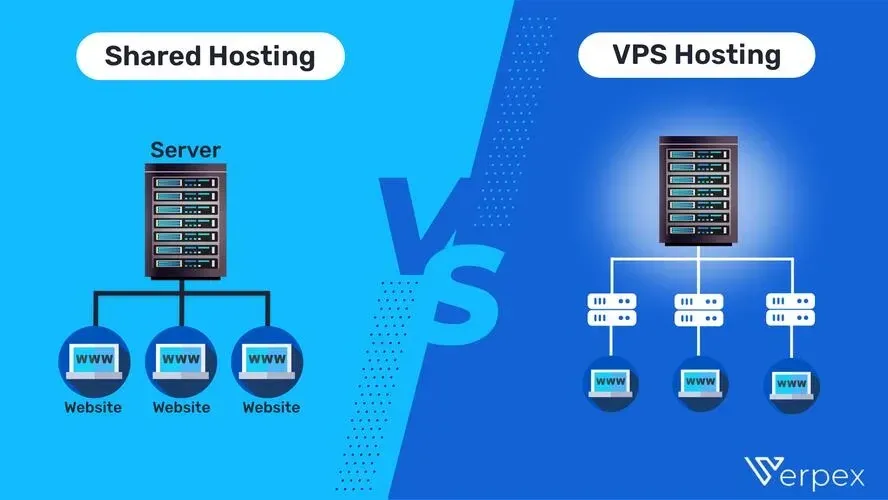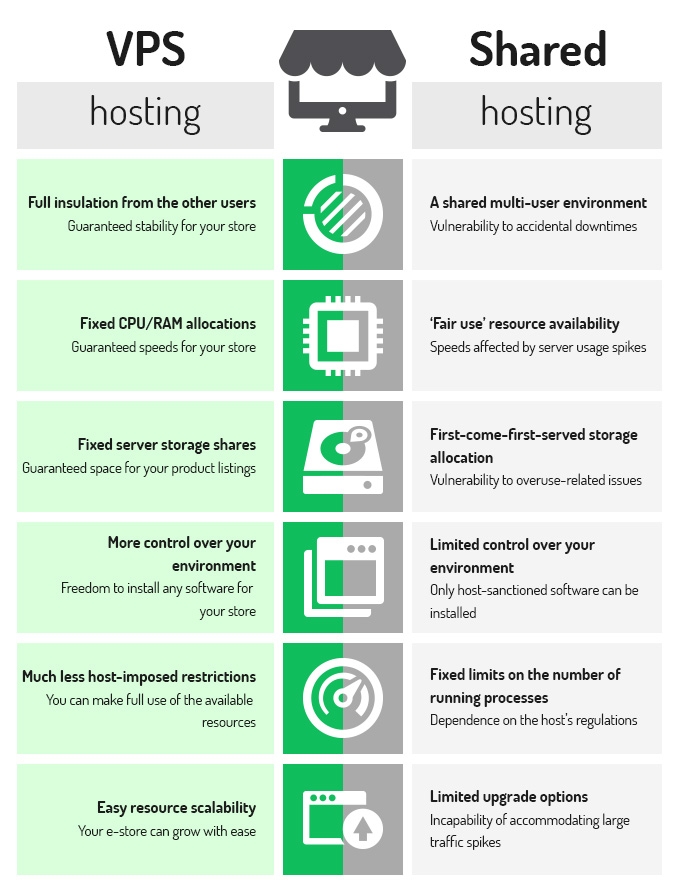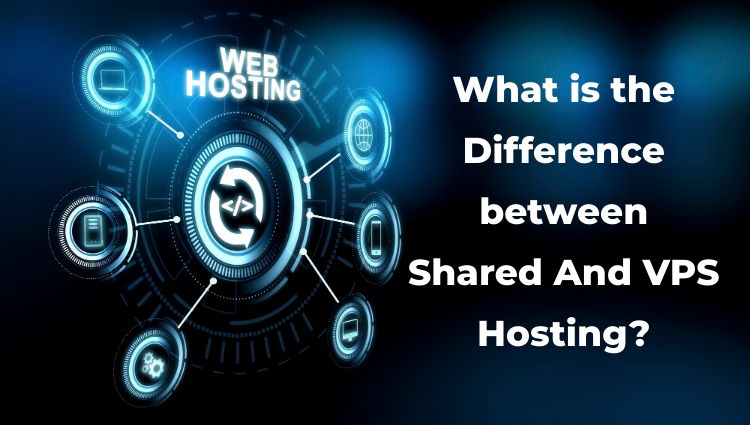Choosing the right hosting plan can be challenging. Shared and VPS hosting are two popular options.
But what sets them apart? Shared hosting is like renting a room in a shared apartment. You share resources with others. VPS hosting is more like owning a condo. You have more control and dedicated resources. Understanding the difference is crucial for your website’s performance and growth.
In this blog, we’ll explore the key differences between shared and VPS hosting. We’ll help you decide which option suits your needs. Whether you are a beginner or looking to upgrade, this guide will provide valuable insights. Let’s dive in and compare shared and VPS hosting to find the best fit for your website!

Introduction To Hosting Types
Understanding the different types of hosting is crucial for your website’s success. The two most common hosting types are Shared Hosting and VPS Hosting. Each has unique features, benefits, and limitations. Knowing these differences can help you make an informed decision.
Overview Of Shared Hosting
Shared Hosting is like renting an apartment in a large complex. You share resources, like CPU and RAM, with other websites on the same server. This makes it a cost-effective option for small businesses and personal blogs.
- Cost-Effective: Shared Hosting is usually cheaper.
- Easy to Manage: Hosting providers handle server maintenance.
- Limited Resources: You share resources with other websites.
Shared Hosting suits small websites with low traffic. It’s simple and budget-friendly.
Overview Of Vps Hosting
VPS Hosting is like owning a condo. You have your own resources but share the physical server with others. This provides more control and better performance.
- Greater Control: You have root access to your environment.
- Scalability: Easily upgrade resources as your site grows.
- Better Performance: Dedicated resources improve speed and reliability.
VPS Hosting is ideal for medium to large websites. It offers better performance and more control.
| Feature | Shared Hosting | VPS Hosting |
|---|---|---|
| Cost | Low | Moderate |
| Performance | Basic | High |
| Scalability | Limited | High |
| Control | Limited | High |
Choosing the right hosting type depends on your website’s needs. Shared Hosting is great for starters. VPS Hosting offers more control and performance for growing websites.
Cost Comparison
Choosing between shared hosting and VPS hosting can be confusing. One of the main factors to consider is the cost. This section will break down the costs associated with each hosting option to help you make an informed decision.
Shared Hosting Costs
Shared hosting is generally the most affordable option. Hosting providers offer plans starting as low as $2 to $10 per month. These plans often include basic features like email accounts, website builders, and customer support. However, the low cost comes with some trade-offs. Resources such as CPU, RAM, and bandwidth are shared among many users. This can lead to slower website performance during peak times.
For small websites or blogs, shared hosting is a budget-friendly choice. It provides enough resources to get started without breaking the bank. Many providers also offer introductory discounts, making it even more affordable for new users.
Vps Hosting Costs
VPS hosting is more expensive than shared hosting. Plans usually start from $20 to $100 per month. The cost varies based on the resources and features included. VPS hosting provides dedicated resources like CPU, RAM, and storage. This ensures better performance and reliability.
For growing websites, VPS hosting offers more control and flexibility. You can install custom software and configure your server settings. The higher cost reflects the enhanced capabilities and dedicated resources. For businesses or high-traffic websites, the investment in VPS hosting can be worth it.
Performance Differences
Understanding the performance differences between shared and VPS hosting is crucial. Performance impacts your website’s speed, reliability, and user experience. Below, we delve into the key performance aspects.
Speed And Reliability
Shared hosting often struggles with speed. Multiple websites share the same server resources, causing slower load times. If one website experiences a traffic spike, it can slow down others.
On the other hand, VPS hosting offers better speed and reliability. Each site has dedicated resources. This isolation ensures that high traffic on one site does not affect others.
VPS hosting provides more consistent performance. It handles larger traffic volumes smoothly.
Resource Allocation
In shared hosting, resources like CPU, RAM, and disk space are divided among all websites on the server. This can lead to limited resource availability during peak times.
Conversely, VPS hosting allocates dedicated resources to each website. This means you get a specific amount of CPU, RAM, and storage allocated to your site.
This dedicated allocation ensures that your website performs optimally. It also allows for better scalability. You can easily upgrade resources as your website grows.
Here’s a quick comparison table:
| Aspect | Shared Hosting | VPS Hosting |
|---|---|---|
| Speed | Variable, often slower | Consistent, faster |
| Reliability | Less reliable | More reliable |
| Resource Allocation | Shared among all sites | Dedicated to each site |
Choosing the right hosting depends on your site’s needs. For better performance, consider VPS hosting.

Credit: verpex.com
Scalability Options
Understanding scalability is crucial for choosing the right hosting plan. Scalability refers to how well a hosting plan can handle increased traffic and resource needs. Two common options are shared hosting and VPS hosting. Each has its own scalability features. Let’s explore the scalability options for both.
Scaling In Shared Hosting
Shared hosting involves multiple websites on one server. Resources are shared among all users. This limits your ability to scale. If your site traffic increases, you may experience slower load times. Shared hosting plans are usually fixed. Upgrading to more resources means moving to a different plan. This can be inconvenient. Shared hosting works well for small websites or blogs with low traffic.
Scaling In Vps Hosting
VPS hosting gives you a portion of a server. It acts like a dedicated server. Resources are allocated to your site alone. Scaling in VPS hosting is easier and more flexible. You can increase resources like CPU, RAM, and storage as needed. This allows your website to handle more traffic smoothly. Many VPS plans offer scalable options. You can upgrade without moving to a different plan. VPS hosting suits growing websites and e-commerce stores. It provides better performance and more control.
Security Features
Understanding the security features of shared and VPS hosting is crucial for making an informed decision. Both hosting types offer distinct security measures tailored to different needs and budgets.
Shared Hosting Security
Shared hosting is like living in an apartment building. You share resources with many other users. Hosting companies implement security measures to protect all users on the server. Firewalls and regular monitoring are standard. However, sharing a server means if one site gets compromised, all others might be at risk too.
Shared servers often have limited customization options. Users cannot install their own security software. This makes it harder to tailor security to specific needs. Despite these limitations, shared hosting is suitable for small websites with low security risks.
Vps Hosting Security
VPS hosting offers a higher level of security. It provides a private space on a shared server. This isolation reduces the risk of other users affecting your site. VPS users can customize security settings. They can install additional software to enhance protection.
VPS hosting usually includes dedicated IP addresses. This can prevent blacklisting issues, which can occur in shared hosting. Regular backups and advanced security protocols are often part of VPS plans. This makes it ideal for businesses needing higher security levels.
Management And Control
When choosing between shared and VPS hosting, understanding the management and control differences is crucial. This aspect determines how much control you have over your hosting environment. Let’s dive into two critical areas: control panel features and root access in VPS.
Control Panel Features
Shared hosting usually offers a standard control panel. This panel is user-friendly and ideal for beginners. You can manage your website, emails, and databases easily. However, the features are limited. You share the resources and control options with other users.
VPS hosting gives you more advanced control panel features. You have greater flexibility and customization options. You can install different software and configure settings according to your needs. This level of control is perfect for tech-savvy users.
Root Access In Vps
Shared hosting does not provide root access. You can only make changes within the allowed settings. This limitation ensures server stability but restricts control.
VPS hosting offers root access. This means you can control every aspect of your server. You can install custom software, modify configurations, and manage security settings. This feature is beneficial for developers and businesses needing specific server setups.
Use Cases
Understanding the use cases for shared and VPS hosting can help you choose the right option. Each type of hosting has its own advantages and is suited for different needs.
Who Should Use Shared Hosting?
Shared hosting is ideal for small websites. New blogs and personal websites often benefit from this affordable option. Low traffic sites work well on shared hosting. Limited technical skills? Shared hosting is easy to manage. Small businesses with simple websites also fit this type.
Who Should Use Vps Hosting?
VPS hosting is suited for growing websites. Businesses that need more control should consider VPS. High traffic sites require the resources VPS offers. Complex sites with custom applications benefit from VPS. Developers needing a testing environment also prefer VPS. If you need scalability, VPS is the way to go.

Credit: blog.resellerspanel.com
Pros And Cons
Choosing between shared and VPS hosting can be challenging. Each has its own benefits and drawbacks. Understanding the pros and cons helps you make an informed decision. Let’s dive into the advantages and disadvantages of both hosting types.
Advantages Of Shared Hosting
Shared hosting is affordable. It is the cheapest option available. Beginners find it easy to use. Hosting companies handle maintenance. You do not need technical skills. Many shared hosting plans offer unlimited storage. You get a lot of resources at a low cost. It’s perfect for small websites and blogs.
Advantages Of Vps Hosting
VPS hosting offers better performance. Your site gets dedicated resources. This means faster load times. VPS hosting provides more control. You can customize your server. It’s more secure than shared hosting. Your site is isolated from others. This reduces the risk of hacking. VPS hosting is scalable. You can upgrade resources easily. It’s ideal for growing websites.
Disadvantages Of Shared Hosting
Shared hosting has limited resources. Your site shares resources with others. This can lead to slow load times. High traffic on other sites affects your site. You have limited control over server settings. This restricts customization. Security is a concern. A breach on one site can affect others. It’s not suitable for high-traffic sites.
Disadvantages Of Vps Hosting
VPS hosting is more expensive. It costs more than shared hosting. It requires technical knowledge. Beginners may find it challenging. You need to handle some maintenance tasks. There can be occasional performance issues. This happens if the physical server is overloaded. It’s not the best choice for very small websites.

Credit: www.linkedin.com
Frequently Asked Questions
What Is Shared Hosting?
Shared hosting is a type of web hosting where multiple websites share the same server resources. This option is cost-effective and easy to manage. However, it may result in slower performance due to resource sharing.
What Is Vps Hosting?
VPS (Virtual Private Server) hosting provides a dedicated portion of a physical server’s resources. It offers better performance, flexibility, and control compared to shared hosting. Ideal for growing websites with higher traffic.
Is Vps Hosting Faster Than Shared Hosting?
Yes, VPS hosting is generally faster than shared hosting. It allocates dedicated resources, ensuring better performance and reduced server load. This makes it suitable for high-traffic websites.
Which Is More Secure: Shared Or Vps Hosting?
VPS hosting is more secure than shared hosting. It provides isolated server environments, reducing the risk of security breaches. Shared hosting may be vulnerable due to multiple websites sharing the same server.
Conclusion
Choosing between shared and VPS hosting depends on your needs. Shared hosting suits smaller websites with lower traffic. It’s cost-effective and user-friendly. VPS hosting provides more resources and control. Ideal for growing websites or businesses. Evaluate your website’s requirements and budget.
Make an informed decision. Happy hosting!







